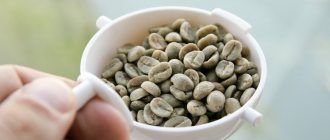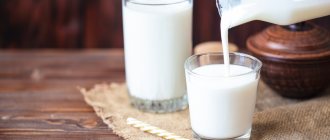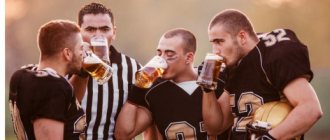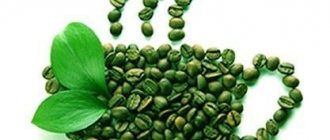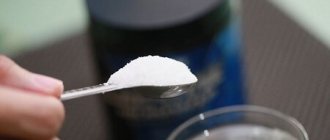How does coffee affect the body before exercise?
Not only the taste, but also the aroma of coffee has an impact on the human body. It is considered the most effective way of toning. Even a small dosage of the substance can cause a surge of adrenaline.
During physical activity, it allows you to increase endurance and improve performance. Before you figure out whether you can drink coffee before training, you should familiarize yourself with the nature of its effect on the body. Drinking a cup before visiting the gym has the following effects:
- After drinking coffee, blood circulation improves by 30%, which helps enrich all cells of the body with oxygen.
- Thanks to the release of a large amount of energy, the workout becomes more productive. This leads to the melting of excess fat.
- Regular consumption in limited quantities improves the body's sensitivity to insulin. This reduces the risk of developing diabetes.
- The likelihood of developing depressive disorders is significantly reduced. Scientists have proven that the drink improves mood and promotes positive thinking.
- Caffeine has the ability to stimulate metabolism, due to which the desired silhouettes are formed faster.
- The drink helps reduce muscle pain during intense exercise.
- In addition to caffeine, the drink contains trace elements, organic acids and vitamins. They are necessary during the recovery period of muscle tissue.
- Moderate consumption of coffee promotes blood flow to the heart during exercise. This helps reduce the strain on the heart muscles.
The benefits and harms of caffeine
Caffeine affects both the physical and mental state of a person. It is especially pronounced during sports exercises.
It must be said that the effect of the popular alkaloid on the body cannot be called unambiguous. Caffeine has both beneficial and harmful properties.
Beneficial features:
- Allows you to train for a longer time.
- Strengthens determination and the desire to immediately achieve higher results.
- Improves mood.
- Improves coordination of movements.
- Reduces the concentration of adenosine, which reduces the force of muscle contraction during sports.
- Increases endurance due to the ability to reduce the amount of potassium in the fluid between muscles.
- Accelerates muscle growth.
- Relieves fatigue and drowsiness.
- Strengthens metabolism.
- Converts subcutaneous fat into energy.
Harm:
- May cause increased excitability and irritability.
- Increases heart rate.
- Increases blood pressure.
- Removes useful minerals such as sodium, potassium, calcium and magnesium from the body.
- Promotes the accumulation of “bad” cholesterol in the blood, which subsequently negatively affects endurance.
- It impedes blood flow to the heart and oxygen supply to the body. This may cause weakness, dizziness, or fainting.
Is coffee before a workout good for burning fat?
There is an opinion that drinking coffee before training starts the process of melting fat deposits. Without added milk and sugar, it does not contain many calories. Natural coffee cannot harm your figure. But the instant drink does not have the best effect on the body. It is high in calories and contains no nutrients. Its toning effect is weak.
When consumed in moderation, natural coffee relieves the feeling of fatigue and starts metabolic processes. As a result of this, the body actually loses extra pounds faster. But there is also a negative side to drinking the drink before going to the gym. It provokes the appearance of cellulite, which makes the skin visually more flabby.
You can replace black coffee with its green counterpart. It consists of Arabica or Robusta beans that have not undergone heat treatment. The taste of the finished drink is herbaceous, complemented by sour notes. The result of weight loss can be from 2 to 5 kg. To enhance the effectiveness of the drink, you must follow the basics of proper nutrition and exercise regularly.
Harm from coffee
To clearly answer the question of whether coffee is ok before training, it is necessary to consider the situation from both sides. And know not only about the possible benefits of its use, but also about the associated risks. Basically, all negative manifestations of drinking are associated with the individual characteristics of the body (coffee intolerance), health status, or abuse of the drink. It is advisable to clearly understand how it acts on internal organs and in which cases it is better to refuse it.
Calcium leaching
Coffee beans contain a huge amount of acids. Even after brewing there are quite a lot of them left. And when drinking coffee, the acid-base balance in the human body shifts in favor of acids. To neutralize the acidic environment, calcium reserves are released, which are then eliminated naturally. One serving of Americano washes out approximately 40 mg of calcium, which must then be replenished. A similar effect is exerted by soda, pickled, spicy, sour foods, semolina and meat. So it’s not just espresso consumption that you should be careful about.
Diuretic properties
Coffee and fitness are categorically incompatible if you have problems with the kidneys or urinary system. During sports, the body already loses fluid, and coffee enhances this process. The effect of a diuretic increases the amount of water lost by the body. And if repeated regularly, this can lead to varying degrees of dehydration, excessive stress on the kidneys, and disruption of the water-salt balance. In the worst case scenario, kidney failure may develop. To replenish your fluid supply, after drinking a cup of Americano before training, drinking water during it is enough. In this way the balance will be maintained.
Getting used to the drink
Constant consumption of invigorating drinks leads to the body becoming accustomed to its effects. And then he needs a larger dosage to get the same results, or the effect is completely opposite: instead of tone, severe fatigue appears. It should be remembered that coffee is a natural stimulant. And it’s better not to drink it before each workout, but alternate it every 1-2. Otherwise, the health outcome may be disastrous.
Effect on the heart and blood pressure
The Center for Integral Human Physiology, together with the Institute of Zurich, conducted research on the effect of coffee drinks on the cardiovascular system of athletes. To do this, the experiment participants were divided into 2 groups, one of which was given 2 servings of strong Americano before training. After performing physical exercises, their pressure and circulation of blood flow in the vessels were measured. It turned out that the substances contained in coffee prevent the passage of blood through the heart and, consequently, the saturation of the cells and tissues of the body with oxygen (the difference in indicators before and after exercise was approximately 25%).
Before physical activity, it is better to refuse a cup of your favorite espresso for those who suffer from hypertension, arrhythmia, pressure changes, tachycardia, etc. If the exercises are to be performed in mountainous areas, then even absolutely healthy people should abstain from the drink.

Drinking coffee can cause negative effects
Amount of coffee for optimal effect
Abuse of caffeine is strictly prohibited. The optimal number of cups drunk per day should not exceed 2 pieces. For an ordinary person, the maximum single dosage is 400 mg, and the daily dosage is 1000 mg. For athletes, a different norm is provided - no more than 300 mg per day. That's about 2 cups of coffee a day.
Periodic breaks lasting 6-7 days will help to avoid the development of addiction. This period of time is enough for the body to return to normal.
The amount of caffeine depends on the type of drink and the type of bean. A cup of espresso contains 40 mg of caffeine. In cappuccino it is half as much. Arabica in its pure form 60 mg of substance per 170 g. ground mixture. Robusta contains up to 200 mg of caffeine. We must not forget that some amount of the invigorating substance is present in chocolate, energy drinks, as well as green and black teas.
The maximum concentration of caffeine is observed approximately an hour after drinking the drink. Therefore, you should drink coffee no later than 40-50 minutes before going to the gym. If you drink it immediately before classes, the desired effect will not be achieved.
Optimal dosage and rules of use
Scientists have not yet come to a final decision on how much coffee you need to drink before training to achieve a positive result. Therefore, it is better to limit the consumption of this and any other drinks containing caffeine.
In addition, coffee has a diuretic effect, so you can experience a number of inconveniences during long-term sports activities. This is especially true for athletes who train outside the gym.
If you decide to cheer yourself up with a fragrant drink, you should adhere to the following recommendations:
- Use only boiled natural product. An instant drink loses a number of beneficial properties.
- Do not drink coffee with sweeteners, including sugar and honey. Sweets can be added to coffee after a workout.
- It is not recommended to pour milk and cream into coffee, as they contain a significant amount of sugar.
- Before class, you can drink espresso or Americano. The fact is that the body requires no more than 1 mg of caffeine per kilogram of weight for additional stimulation. A cup of espresso contains 96 mg of the alkaloid, and an Americano contains about 78 mg.
- After drinking coffee, you should not immediately start training. You should wait about half an hour.

When can you drink coffee before exercising?
Pre-workout coffee may be helpful in the following cases:
- When you need to provide emergency assistance to the body. For example, get rid of drowsiness, overcome laziness, or cheer up and cheer up.
- If necessary, get rid of extra pounds. Caffeine taken 30 minutes before exercise can immediately increase calorie expenditure by 10-50%.
- When to extend the training time and make it as intense as possible. The alkaloid promotes the release of additional adrenaline into the blood. As a result, the athlete does not feel tired for a long time. 2 cups of coffee drunk before training increases endurance by 20%. It is important that dehydration does not occur.
- If a person often experiences shortness of breath while playing sports. Coffee helps contract the diaphragm muscles and helps cope with this problem.
- When intense exercise causes muscle pain. Studies have shown that 2 cups of coffee drunk an hour before training reduces pain by 48%. Coffee after a workout will help you consolidate your results.
Recommendations
- According to scientists from Australia, it is especially useful to drink coffee after a workout along with fast carbohydrates. This combination helps to immediately restore strength and energy reserves.
- Bodybuilders, cyclists, runners, as well as those involved in team sports can cheer themselves up with the help of an alkaloid. But it is strictly not recommended for skiers and climbers to drink coffee in any dosage before training. Blood flow through the heart can be reduced by up to 40% at significant altitudes.
- In order to restore the body’s water balance after drinking your favorite drink, you need to drink a sufficient amount of regular water per day.
- You should not drink more than 3-4 cups of drink daily. It is best to limit yourself to a few servings per week.
- Reasons to avoid drinking coffee after a workout include:
- high blood pressure;
- heart disease;
- increased excitability.
As we can see, caffeine before a workout can sometimes be beneficial. But not every sports fan can take it. To protect yourself from unpleasant side effects, it is best to first consult with a specialist.
We also recommend reading: How coffee affects the heart.
photo: depositphotos.com/merznatalia, dedivan1923, alan64
What kind of coffee can you drink after finishing your workout?
After physical activity, there is a desire to restore strength with the help of available means. So, the idea arises to drink a cup of black coffee. But it is not the most successful, because coffee during this period has a negative effect on the body.
After transferring the load, the muscles need time to rest. During this period, it is advisable to eat more protein foods and avoid unhealthy foods.
Coffee after exercise leads to increased excitability of nerve fibers. Rest in such conditions becomes impossible. If the drink is drunk in the afternoon, problems with sleep appear. They cause irritability and decreased performance during the daytime. In this case, the meaning of physical exercise is lost.
Another reason not to drink coffee after exercise is to stay hydrated. With the help of water, breakdown products are removed from the body and glycogen is replenished. With a lack of fluid, the muscles do not recover properly.
Caffeine has an inhibitory effect on important physiological processes by retaining moisture.
Daily dosage of coffee
Experts do not recommend consuming even natural coffee even if a person is not involved in professional training. You should drink no more than two cups a day. Exceeding the recommended dosage may lead to hypertension, rapid heartbeat, nervous agitation and hyperactivity. In large quantities, coffee not only does not prevent heart disease, but also contributes to its development. Even a natural product can leach calcium, which can lead to such a serious musculoskeletal disease as osteoporosis.
Also, drinking the drink in large quantities inevitably leads to darkening of the tooth enamel.
As for drinking coffee before and after workouts, it is not advisable, as some experts say. Avoid using it immediately after finishing physical activity. You can drink the drink one to two hours after finishing your workout. This will not only not cause harm, but will provide the body with invaluable benefits.
Contraindications for use
It is highly not recommended to drink coffee if there are contraindications. This is fraught with deterioration in health and exacerbation of existing diseases. The main contraindications include the following:
- period of bearing a child;
- impaired visual function;
- diseases of the digestive system;
- cardiovascular pathologies.
If one or more contraindications are detected, you should stop drinking the aromatic drink.
In this case, you can replace it with more gentle analogues. Among them, chicory is distinguished. It differs not only in its pleasant taste, but also in a number of useful properties. Pregnant and lactating women are allowed to drink chicory. It has an immunostimulating, anti-inflammatory and calming effect.



